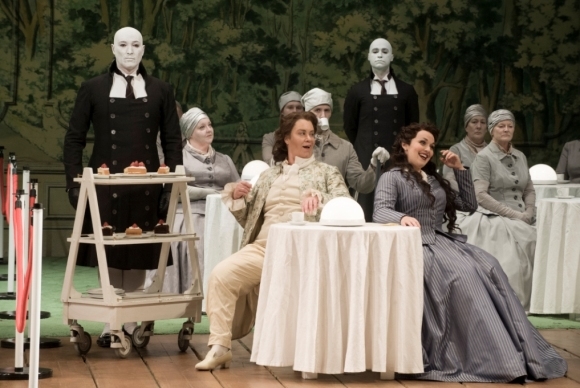Xerxes (London Coliseum)

© Mike Hoban
Wonderfully cast for the most part, sung with exemplary diction and magnificently conducted by Michael Hofstetter, it dazzles the ear as well as the eye. From the outset, once Handel’s three-part overture had set off at a breezy lick, it was clear we were in safe hands as a Baroque-ified ENO Orchestra revelled in the scoring and responded tirelessly to the German’s assured guidance.
The plot is pretty standard for a comic opera of its time. King Xerxes is betrothed to Amastris but desires Romilda, daughter of the army commander Ariodates, who herself is inconveniently enamoured of the king’s brother, Arsemanes.
Not exactly subtle, then; but the tyro Hytner’s skill in directing this naïve and simple comedy was to embroider it with a thousand fleeting moments of visual sophistication. Thanks to these, interest is not only sustained throughout the dramatic stasis of Handel’s da capo arias, it’s intensified. Hytner and Walling make their directorial inventiveness seem effortless, even though locating and maintaining the comedy in Handel is a challenge that’s defeated directors as eminent as Richard Jones in last year’s flat-footed Rodelinda.
David Fielding designed Xerxes‘s world as a kind of Victorian garden that Hytner then peopled with automaton-like flunkies and visitors. The set’s manicured beauty is about as naturalistic as an episode of Dr Who, yet within its own universe everything that happens seems entirely logical.
'this peerless Xerxes should be safe for a few decades yet'
Sight gags abound, as does expert comic timing. Alice Coote, one of this country’s great Handelians and a mezzo at the height of her powers, assumes the title role with plenty of style and not a little swagger, but she also locates her character’s funnybone and raised hoots of laughter with some immaculate double-takes. As for her singing of Hytner’s own excellent translation, it was bliss.
Sarah Tynan (who sang Atalanta in the last revival nine years ago) is a gorgeous Romilda with a world-class voice and a stage presence that’s a match for anyone. The same is true of this year’s Atalanta, ENO Harewood Artist Rhian Lois, and the fine baritone Adrian Powter (Elviro) and bass-baritone Neal Davies (Ariodates).
Another ENO Harewood singer, mezzo Catherine Young, more than held her own in this exalted company as Amastris, but she could do with getting her voice ‘out there’ a little more. The opposite is true of Andrew Watts, one of the strongest counter-tenors around and someone who really didn’t need to oversing – and thereby stretch his resources beyond the limits of tonal beauty – quite as much as he did.
It's been an unwelcome habit in the past decade for ENO to replace its best productions with inferior fly-by-night novelties. Ditched beauties A Midsummer Night’s Dream, Billy Budd and Hytner's own Magic Flute are just three of the company’s most recent shootings-in-foot. It was part of a death wish that with luck the company has now behind it; if so, this peerless Xerxes should be safe for a few decades yet. Catch it now, though, if you can. Just in case.










